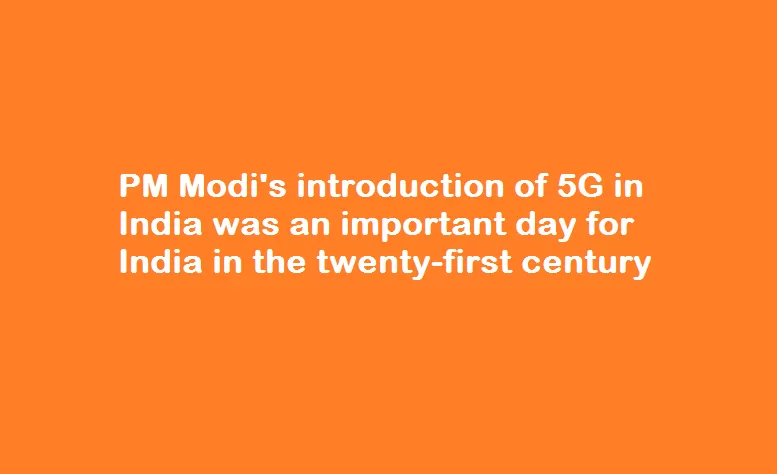Live Mint has recently reported that the introduction of 5G in India by PM Modi is set to revolutionize how Indians communicate and access information. This move will boost India’s economy and place it on par with other developed nations. The fifth-generation wireless technology promises faster data transfer rates, lower latency, and greater bandwidth, enabling seamless connectivity for smart cities, autonomous vehicles, and IoT devices.
With the introduction of 5G in India, industries such as healthcare, education, agriculture, and manufacturing benefit from improved efficiency and productivity. Moreover, the digital divide between rural and urban areas will narrow significantly as 5G networks reach remote locations. In conclusion, PM Modi’s bold step towards introducing 5G in India is a significant milestone that will transform how we live and work in the coming years.
Explanation of 5 and how it works
5G is the fifth generation of wireless technology. It operates on a higher frequency and offers faster data transfer speeds, lower latency, and increased network capacity. The technology relies on small cell sites placed closer to provide coverage in more areas.
One of the key features of 5G is its ability to support massive machine-to-machine communication, which is necessary for the Internet of Things (IoT). This means that devices can communicate with each other without requiring human intervention. 5G networks will also enable new applications like smart cities, autonomous vehicles, and virtual reality experiences.
The rollout of 5G technology has significant implications for healthcare, education, transportation, and entertainment industries. For example, telemedicine could become more accessible in rural areas with limited medical resources but reliable internet connectivity. Virtual reality classrooms could be created in education settings to enhance student learning experiences. The introduction of 5G in India marks a significant step towards achieving a more connected future.
How 5G Benefits India’s Economy
According to NDTV News, 5G technology in India can potentially revolutionize many sectors of the economy, including healthcare, agriculture, and manufacturing. The higher speeds and lower latency of 5G networks will enable doctors to perform remote surgeries with greater accuracy and allow farmers to use precision farming techniques that require real-time data analysis. In manufacturing, 5G-powered systems can enable predictive maintenance, reducing downtime and increasing productivity.
Moreover, 5G networks can boost e-commerce platforms by providing faster download speeds and better connectivity. This is a significant advantage since e-commerce is rapidly growing in India. Additionally, it can benefit businesses that rely on constant communication with their customers or suppliers as they may make quicker decisions based on real-time information through 5G networks.
In conclusion, introducing 5G technology in India will help transform its economy by creating new opportunities for growth across various sectors. It has great potential to increase efficiency levels while reducing costs for individuals and enterprises.
How 5G improve daily Life for Indian Citizens
- Firstly, 5G technology has the potential to revolutionize the way we use our smartphones. With its faster speed and lower latency, citizens can expect seamless video streaming, quicker downloads and uploads, and better connectivity on social media platforms. This means that people can stay connected with friends and family more easily, even in remote areas where network coverage is usually problematic.
- Secondly, 5G technology can improve healthcare services in India through telemedicine services. Patients in rural areas will have access to quick medical advice from doctors elsewhere as 5G technology enables high-quality video calling with low latency. This will help reduce travel costs for patients who would otherwise need to travel long distances for medical consultations.
- Thirdly, 5G networks are expected to significantly improve transportation networks by enabling autonomous vehicles through real-time communication between vehicles and infrastructure. This will enhance road safety while reducing congestion levels on Indian roads. Implementing this technology will also likely boost the country’s economy by increasing productivity across different industries, such as manufacturing and agriculture.
rajkotupdates.news:pm-modis-developed-country-goal-is-the-first-of-the-five-pledges
The importance of India’s adoption of 5G technology
Adopting 5G technology in India is crucial to the country’s digital transformation. The faster internet speeds and low latency offered by 5G will enable the development of innovative technologies like autonomous vehicles, smart cities, and advanced healthcare systems. The high-speed connectivity will also improve productivity and efficiency across various sectors, leading to economic growth.
Moreover, 5G technology can bridge the digital divide between urban and rural areas in India. The improved connectivity can provide access to education and healthcare services in remote regions that were previously inaccessible. Additionally, it can create new job opportunities for skilled professionals in the telecommunications sector.
India’s adoption of 5G technology will also have geopolitical implications. It can position India as a significant player in the global digital economy and strengthen its relationships with other countries investing in 5G technology. The introduction of 5G is a critical milestone for India’s technological development and economic growth potential.
Read Also: rajkotupdates.news:gst-council-no-gst-will-be-charged-on-these-14-items
